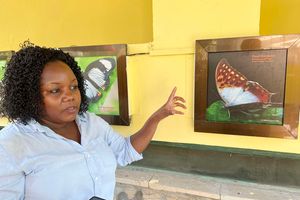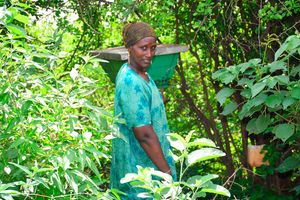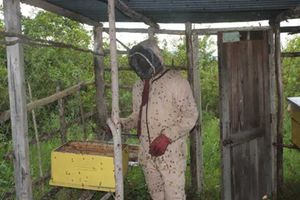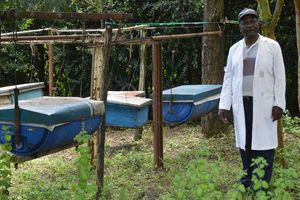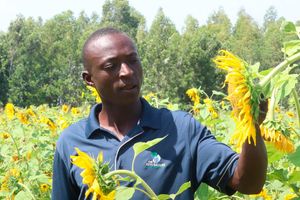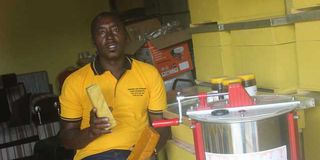
Julius Matheka Mutuku, an apiarist, at his shop in Miw'ani in Machakos County on December 5, 2024.
In the quiet slopes of Yumbani village in Nduu sub-location, Machakos County, some six kilometres from Mutituni Market, we find Julius Matheka Mutuku, an apiarist who has mastered the art of raising and maintaining bee colonies and their hives. He tells us that he does not keep bees as a hobby but he farms them for commercial purposes.
The cool ambience and the sweet scent welcomes us, and Mutuku is quick to clarify that the scent is therapeutic. The four-acre farm hosts 20 hives, though he has three other apiaries holding a total of 115 hives. At the farm two types of hives dominate: Kenya Top Bar Hive and the Langstroth hive.
Mutuku’s bee farming is purely organic as he says that the use of artificial chemicals will either kill the pollinator bees or degrade the soil or even kill the beneficial insects.
With this type of bee farming, he explains that he is not just looking for honey as the sole by-product but he is also focusing on five other products namely: propolis, bee venom, royal jelly, beeswax and pollen all of which he targets to add value.
At the farm he works in a systematic way where he starts by selecting the right location. “In setting up an apiary I start by selecting the site. It should be one that is quiet with some cool shade and sunlight. It should be protected from direct wind and still be close to a reliable source of water while being free from human and animal disturbance,” he says.

Bees. An apiarist who has mastered the art of raising and maintaining bee colonies and their hives.
After establishing a site, Mutuku focuses on growing plants and herbs that are highly attractive to bees, those that lure bees into the hive. The plants include osmanthus, rosemary, mint, oranges, cypress and blue gum trees among others.
He then stocks the hives. “Here I place the catch box on a higher ground and I clean it with herbs that attract bees and wait till the hive is colonised,” he says.
In maintaining the apiary, Mutuku ensures that he inspects both the hives and the colonies every one and a half months or twice before the harvesting period. “With a good environment like in Machakos, farmers can harvest up to three times a year,” he says.
In further maintaining the apiary, all the unwanted weeds around the hive are removed. He then puts used oil on the metal stands. The oil is meant to ensure that the safari and black ants don’t gain access to the hive.
“Though I now use grease after realizing that most oil is contaminated and kills the bees,” he says.
There are also other predators that Mutuku strives to keep away, like thieves and honey badger through fencing.
He sells a kilogramme of honey at Sh1,500.
To conduct a verification of pure honey, Mutuku advises customers to check on the viscosity of the honey as it is trickling down. “The honey should not break and if it breaks, then it is not pure, it means that something has been added to the honey, things like molasses and jaggery among other substances,” he says.
Some of the bio products that he value adds includes propolis that he sells a kilogramme at Sh3,500. From the propolis, he makes propolis tincture which is used in treating flu, persistent coughs, throat cancer and stomach issues. A 60ml container of propolis tincture goes for Sh300.
For the bee venom, Mutuku uses a bee venom collector which he places at the entrance of the hive. Once the bees step on it, they suffer a shock and immediately they produce the venom to fight back, a practice that doesn’t kill them,” he says.
To get a gramme of venom, Mutuku says one will need to trap at least 10 colonised hives. One gramme of venom goes for between Sh7,000 and Sh10,000.
When it comes to value addition he takes a gramme of bee venom and mixes it with a kilogramme of pure honey. Once the venom has been value added into the honey, the price of one kilogramme of honey changes from Sh1,500 to between Sh8,000 and Sh10,000.
In value adding bees wax Mutuku explains that once honey is harvested from Kenya Top Bar Hive, the honey combs are cut with a knife and put in a honey presser machine where all the honey is squeezed out and the end product is empty combs which are then squeezed until they crumble, a factor that helps make beeswax.
The combs are then placed in a cooking pan where they are washed and boiled completely, after which the contents are sieved and the water turns out to be quite important as it carries the wax. Once the water is sieved it is put in a container for at least 24 hours after which one will find the beeswax up and floating. One kilogramme of the beeswax goes for Sh1,500. The beeswax is used in making candles, in the cosmetics industry and in leather shoe production.
Mutuku also makes a starter from beeswax which is used in the langstroth hive to attract bees.
One piece of the starter goes for Sh250. He also makes body cream using wax, liquid paraffin, borax and some distilled water.
In further maximising on his profits, Mutuku who has four farmhands sells a brood box at Sh15,000 while a super box goes for Sh20,000.
With this, Mutuku explains that the venture is viable and is economically profitable. “Bee keeping is an economically profitable activity that can serve as a key intervention to the young people as it is a low risk investment that does not require high initial investment, it still does not necessitate one to have a lot of space and it has low maintenance cost. Better still it generates revenue in a relatively short period and with a faster reproduction than other livestock.
According to Mutuku, the venture is so important that it not only benefits the bee farmers but also the general public in crop pollination while maintaining both plant biodiversity and the ecology at large.
Mutuku also conducts training for two days at Sh5,000 per individual per day and Sh3,000 when it is a group.
Anthony Musili from Biovision Africa Trust, a field officer at Machakos County says that they aim to empower farmers with skills for self-reliance, economic empowerment that is sustainable and safe for food production while addressing human, animal, plant and environmental health by use of climate smart technologies.

